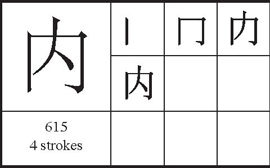
NÈI, inside [A] L4
Suggest memorizing nèi as a picture of a person entering a space marked off by the “borders” radical.
内容 nèiróng content, substance [A] L4
内地 nèidì interior (of a country) [D]
内在 nèizài be inherent, intrinsic [D] L6
内心 nèixīn heart; innermost being [D]
三天内 sāntiānnèi within three days
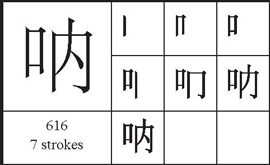
NE/NA, particle indicating two closely related questions, a pause (“as for ...”), a mild warning, a continuing state (“still”), an antagonistic retort (“Whadda ya mean, ...?”), “as much as ...,” “really, even” [A]
(See Chao’s Grammar, pp. 801-03.) ...
着呐....zhene “Oh, yes, ... is true.” (See Chao’s Grammar, pp. 809-10.)

BǏNG, fish tail; the third “heavenly stem” (used to enumerate headings in an outline, like “C”—third letter of the Western alphabet). [C] L5
See Lin Yutang’s Dictionary 1451f for an account of the “heavenly stems.”
丙夜 bǐngyè midnight

GUÒ, to go over [A] L2
过来 guòlái to come over [A]
过去 guòqù to go over; to die; in the past [A] L3
过年 guònián to celebrate the New Year [B]
过分 guòfèn be excessive, go over the (due) measure [C] L5
(MN) Go over an inch
過

ZÌ, nose; self; from. SMALL NOSE radical (180) [B] (Distinguish from 目 “eye,” 129.)
A picture. Compare with the radical 鼻 (Pt. 2, p. 231b).
自己 zìjǐ self, oneself [A] L3
自我 zìwǒ self- (before 2-syllable verbs) [B]
自从 zìcóng from, since [B] L5
自学 zìxué to study independently [B]
自行车 zìxíngchē bicycle [B] L2

CǍI, to cull, to pick, to pick out, to gather; to extract, to mine; bright colors; CULL radical (197) [B]
“Claws” + “tree” = to pick (hunting and gathering).
采茶 cǎichá to pick tea
采取 cǎiqǔ to take; to adopt [B] L5
采用 cǎiyòng to adopt, to use [B]
风采 fēngcǎi elegant demeanor (or appearance) (first six meanings only)
採

CǍI, be ornamented; good luck; colorful [A]
五彩 wǔcǎi be multi-colored
彩蛋 cǎidàn Easter egg (the painted one, not the chocolate one)
彩弹 cǎidàn paintball
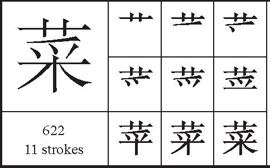
CÀI, vegetables; course or dish in a Chinese meal [A] L1
点菜 diǎncài to choose dishes (from a menu)
菜地 càidì vegetable plot
一道菜 yídào cài one course (of a meal)
荤菜 hūncài a meat dish
素菜 sùcài a vegetable dish

CǍI, to trample underfoot; to step on [B] L5
The “foot” radical helps with the meaning.
踩高跷 cǎigāoqiāo to walk on stilts

DĪNG, person; nail; be strong; single; the fourth “heavenly stem” (used to enumerate items in an outline, like “D”—fourth letter of the Western alphabet); a family name [C] L5
For more on the “heavenly stems,” see Lin Yu-tang’s Dictionary 1451f.
尼古丁 nígǔdīng nicotine
丁字街 dīngzìjiē T-shaped junction
丁字裤 dīngzìkù T-back
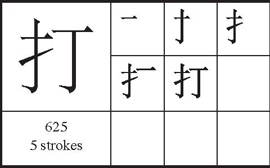
DǍ, to beat [A]; from [C]; DÁ, a dozen [C]
打听 dǎtīng to inquire [B] L5
打开 dǎkāi to open
打扮 dǎban to put on make up; dress up L4
打入 dǎrù to branch out (in business); to force your way in
打字机 dǎzìjī typewriter
打交道 dǎjiāodào to make contact with; to have dealings with [C] L5

SUÀN, to add up; to add in; to consider as [A] L4
打算 dǎsuàn to plan to [A] L3
算了 suànle That’s enough! Forget it! L6
心算 xīnsuàn do arithmetic in your head
笔算 bǐsuàn do arithmetic with pencil and paper
(MN) Cyclops wears a bamboo hat
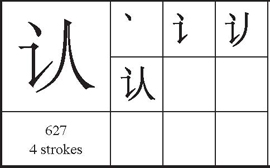
RÈN, to recognize; to admit [A]
The “side-word” radical for meaning, rén “person” (replacing a complex phonetic) to suggest the sound.
认为 rènwéi to think, feel, deem [A] L3
认真 rènzhēn be conscientious [A] L3
认得 rènde to recognize [B]
认字 rènzì be literate
認

SHÍ, to know; knowledge [A]; ZHÌ (bookish) to remember; a mark, sign
认识 rènshi to recognize, to know [A] L1
常识 chángshí general knowledge [C] L5
识别 shíbié to distinguish, discern [D] L6
识字 shízì be literate
識

DǏ, foundation; bottom [B] L4
A sound meaning compound, although 氐 (dǐ) is now obscure.
底下 dǐxia underneath, below [B]
底子 dǐzi background, origin, foundation; original copy
年底 niándǐ year’s end
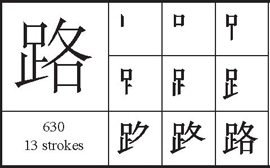
LÙ, road; kind, sort; family name [A] L2
The “foot” radical for meaning (“road”); the other part once gave the sound.
路上 lùshang on the road; en route [B]
路口 lùkǒu (road) intersection [C]
路过 lùguò to go past [C]
路子 lùzi approach, means; “pull” [D]
走路 zǒulù to walk

BÌNG, sickness, be sick [A]
The “sick” radical + bǐng (617) for sound.
看病 kànbìng to see a doctor; to examine a patient [A]
病人 bìngrén an invalid, a patient [B]
病房 bìngfáng sickroom, ward [B]
生病 shēngbìng to get sick [C] L2
病情 bìngqíng patient’s condition [C]
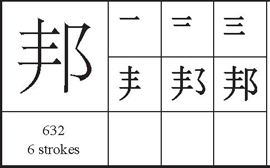
BĀNG, nation [D]
The “right ear/city” radical helps with the meaning.
邦交 bāngjiāo diplomatic relations
城邦 chéngbāng a city-state
联邦 liánbāng federation; union; common -wealth
邦联 bānglián confederation

BĀNG, to help; clique, group [A]
Bāng (632) gives the sound. “Cloth” is abbreviated from an earlier “riches,” perhaps with the idea “help (collaboration) is important in creating wealth.”
帮忙 bāngmáng to help [B] L3
帮手 bāngshǒu helper
一帮人 yìbāng rén gang, clique
幫

BǍNG, to bind, to tie; to kidnap [C]
The “silk” radical is there for the meaning, 邦 bāng (632) for the sound.
绑架 bǎngjià to kidnap L6
綁

CHUÍ, to droop [C]
Chuí was originally a picture of a tree with drooping leaves.
垂直 chuízhí be perpendicular, vertical [C] L6
垂老 chuílǎo (bookish) to be getting old
垂青 chuíqīng (bookish) to appreciate (a person), favor a person

SHUÌ, to sleep; to lie down [A]
Chuí (635) is probably in 睡 to give the sound, but 睡 can also be explained as a meaning-meaning compound: “eye” + “to droop” = “to nod off, to sleep.”
睡衣 shuìyī pajamas
睡意 shuìyì sleepiness, desire to sleep

DÀI, belt; to wear around the waist; to bring along [A] L3
带头 dàitóu to take the lead; to take the initiative; to set an example [C]
带路 dàilù to show or lead the way [C]
皮带 pídài a belt
带孩子 dài háizi to bring up a child
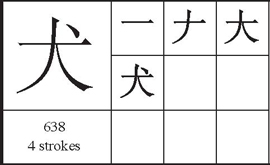
QUǍN, dog. DOG radical (96) [D] L6
The “dog” radical was a picture of a dog, corrupted over time to “big” + “dot.” Care should be taken to distinguish the “dog” radical from “big” 大 (61, p. 13) and from 太 (98, p. 20). Note that there is also a “side-dog” radical (183, p. 37).
犬牙 quǎnyá a canine tooth; a dog tooth

KŪ, to cry, to howl [A] L3
Kū combines meanings: “dog” + “mouth” = “to howl, to cry.” This was originally the top part of 丧 “to mourn”—traditional form 喪 (Pt. 2, p. 269a); the bottom was a person, hidden in the grave.
哭笑不得 kū-xiào bùdé not know whether to laugh or cry; find a thing both painful and amusing

PÍNG, to weigh; be calm, level, flat [A] L5
Píng is a picture of a scale in balance.
平常 píngcháng be ordinary [B] L5
平等 píngděng be equal [B] L5
平原 píngyuán a plain (flatland) [B] L6
平方 píngfāng (in math) square [B] L5
平时 píngshí in ordinary times [B] L4
平行 píngxíng of equal rank; parallel [C] L6

PÍNG, to comment on, criticize; to judge [A]
“Words” + “to weigh” can easily be seen as a meaning-meaning compound for “to criticize, to judge.” Karlgren sees 640 and 641 as standing for the same word, etymologically (AD 743).
评估 pínggū to estimate; to evaluate L6
评论 pínglùn to comment; commentary L6
評

PÍNG, first syllable of 苹果 píngguǒ, “apple” [A] (For 果, see 690, p. 139.)
平 píng (640, above) gives the sound. The “grass” radical (as indicative of plants, flora) helps with the meaning.
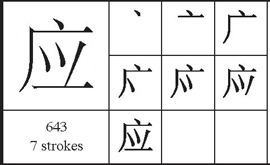
YĪNG, to promise; ought; a family name; YÌNG, to respond; to turn out to be true [A]
应用 yīngyòng to put into practice [B] L5
答应 dāyìng to reply, to answer L5
应得的 yīng déde ought to be gotten; be deserved
應

DĀNG, to serve as; in the presence of; the very same; DÀNG, to think (mistakenly) that; to pawn [A] L4
应当 yīngdāng ought to (do) [B]
当时 dāngshí (at) that time [B] L4
当铺 dàngpù pawnshop
当 … 的时候 dāng... de shíhòu just when… [B]
當

FǍ, method, way, law; doctrine [A]
法文 fǎwén French language [A]
法子 fǎzi way, method [C]
法令 fǎlìng laws and decrees [C]
说法 shuōfǎ wording; explanation; view [C]
法院 fǎyuàn law court [C] L5
法官 fǎguān a judge [D]
法人 fǎrén (law) person; corporation [D] L6

PÀ, to fear [A]
“White” + “heart” = “to fear.” Bái “white” is probably there to give the sound (but English has “lily-livered”—from an earlier “white-livered”).
可怕 kěpà be frightening, scary [B]* L5
怕人 pàrén be shy (afraid of people); be frightening (making people fear)*
怕太太 pàtàitai be afraid of your wife
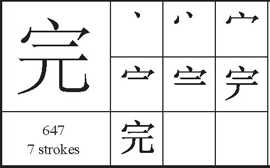
WÁN, to finish; family name [A] L2
完成 wánchéng to complete [A] L3
用完 yòngwán to use up, be used up
完儿完 wánr wán (colloquial) be kaput, finished, “done for”
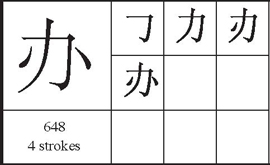
BÀN, to do, to manage; to punish [A]
The “strength” radical (suggesting exertion) may help with the meaning. The two dots can be taken as sweat.
办法 bànfǎ method, way [A] L3
办事 bànshì do a job; manage [B]
办公 bàngōng to work (in an office); to take care of official business [B]
置办 zhìbàn to purchase
辦
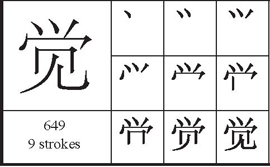
JUÉ, to feel; JIÀO, to sleep [A]
觉得 juéde to feel [A] L2
睡觉 shuìjiào to sleep [A] L1
听觉 tīngjué sense of hearing
覺

CUÒ, to make a mistake [A] L2
Original meaning is “to inlay,” thus with the “gold” radical. This meaning is very minor nowadays.
错金 cuòjīn to inlay gold
不错 búcuò be pretty good [A]
错字 cuòzì incorrectly written character; misprint [C]
错过 cuòguò to miss a chance
错觉 cuòjué illusion, wrong impression
錯

HUÀI, be bad, rotten, sly [A] L3
The right-hand part of 坏 has nothing to do with the negator of verbs 不. It is just a shorthand way to suggest the right-hand part of the traditional character (see below, this frame).
车坏了 chē huàile The car broke down.
壞

HÉ, river [A] L3
Kě (106, p. 22) gives the sound; the “three-dots water” radical, of course, gives the meaning.
河道 hédào river course, riverbed [D]
河口 hékǒu mouth of a river
河马 hémǎ hippopotamus
黄河 huánghé the Yellow River (in China)

YÚ, fish; family name. FISH radical (210) [A] L2
飞鱼 fēiyú flying fish
鱼网 yúwǎng fishnet
金鱼 jīnyú goldfish
煎鱼 jiān yú fried fish
生鱼片 shēngyúpiàn “raw fish slices,” sashimi
魚

YǑNG, be eternal [A]
The character is supposed to be a picture of water currents and thus suggests “go on and on” like flowing water: “be eternal.”
永远 yǒngyuǎn forever, always [A] L4
永不 … yǒngbu… never…
永生 yǒngshēng (religious term) eternal life; be immortal
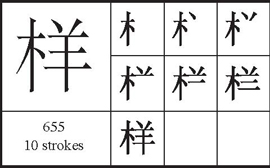
YÀNG, kind, sort [A]
A sound-meaning compound, with “羊” to suggest the sound.
样子 yàngzi style [A] L4
这样 zhèyàng in this way; so [A]
怎样 zěnyàng how?; in a certain way [A]
一样 yíyàng be alike L3
怎么样 zěnmeyàng how?; …, how about it?; How’s everything?; in a certain way, in any way [A] L1
樣
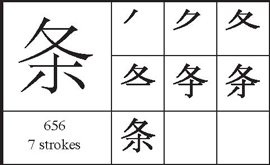
TIÁO, a twig; a long, narrow thing, a strip; section; a measure for roads, rivers, fishes, some animals; a note (short message) [A] L3
条件 tiáojiàn terms, conditions [A] L4
便条 biàntiáo brief note [B] L6
条子 tiáozi a strip; short note, (vulgar) cop [D]
一条鱼 yìtiáo yú a fish
條

BĪNG, ice. ICE radical (8)
Note the similarity between the “ice” radical and the “three-dots-water” radical (77, p. 16). The “ice” radical has two dots instead of three.

CÌ, a time; a measure for times or occasions [A]; be next (in order); be inferior to [C] L2
三次 sāncì three times
次要 cìyào second most important, minor [C] L5
下次 xiàcì next time
首次 shǒucì the first time
真次 zhēncì be really inferior, be awful
(MN) Be the next to be in lack of ice

DUǍN, be short (opposite of long); to lack [A] L3
The first example below illustrates a favorite Chinese technique of word-formation, putting two contraries together to form an abstract noun: “the long and the short of it” = “length.”
长短 chángduǎn length [D]
短少 duǎnshǎo be deficient, to lack
(MN) The arrow and the pea are short
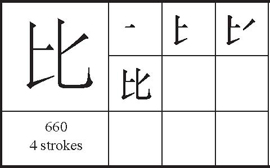
BǏ, set side by side, to compare. COMPARE radical (123) L2
The modern character looks like “ladle” + “ladle” (41, p. 9). The old forms have two people standing side by side. In any case, there are two similar objects side by side, as if for comparison.
比较 bǐjiào to compare [A] L3
比赛 bǐsài a competition, a match L3

JÍ, to reach, together with; and; see 来得及 and 来不及, below [B]
及时 jíshí be timely; be seasonable; promptly, without delay [B] L4
及早 jízǎo as soon as possible; at an early date [D] L6
来得及 láidejí there’s still time, it can be done [B] L4
来不及 láibují it’s too late to do it now [B] L4
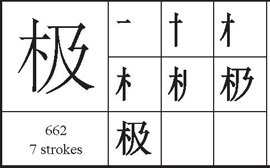
JÍ, to reach an extreme; extremely; pole (extreme point) [A] L3
及 jí (661, above) gives the sound.
(verb) + 极了 …jíle be extremely…: e.g., 好极了 hǎojíle Superb! Great! [A]
极力 jílì with all your strength [D]
极点 jídiǎn extreme point
北极 běijí the North Pole L6

JÍ, level, class, grade; a measure for levels, classes, and grades [A]
及 jí (661, above) gives the sound.
级别 jíbié grade; level L6
高级 gāojí high-grade; high-ranking L4

XĪ, to inhale; to soak up [B]
The “mouth” radical helps with the meaning; 及 jí (661, above) at one time helped with the sound.
吸收 xīshōu to absorb L5
吸引 xīyǐn to attract L4

NÁN, south; family name [A] L3
English speakers say “southwest”; Chinese speakers “westsouth.” See also 666.
南方 nánfāng south; S. China [B]
西南 xīnán southwest; SW China [B]
东南 dōngnán southeast; SE China [B]
南极 nánjí South Pole
南京 Nánjīng Nanjing (the city)
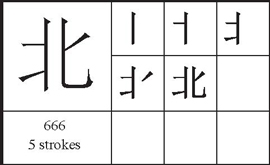
BĚI, north [A]
Two people sitting back to back, this is the original character of 667 背. Current meaning mostly by sound-loan with a little bit of association.
北方 běifāng the North [B] L3
东北 dōngběi northeast; NE China [B]
西北 xīběi northwest; NW China [B]
北京 Běijīng Beijing L1
城北 chéngběi north of the city
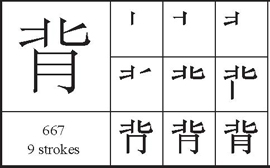
BÈI, back; to turn one’s back on; be unlucky, hard of hearing; to memorize; to recite; BĒI, to carry on the back [B] L5
背后 bèihòu in back of; behind someone’s back
背包 bēibāo knapsack
耳背 ěrbèi hard of hearing
(BĒI only) 揹

ZUǑ, left (opposite of right) [A]
左手 zuǒshǒu left hand
左翼 zuǒyì left wing, the left wing, left flank
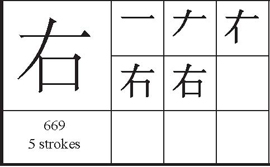
YÒU, right (opposite of left) [A]
左右 zuǒyòu left and right; alternately L6
左右开弓 zuǒyòu kāi gōng fire away left and right; be ambidextrous
十个左右 shíge zuǒyòu approximately [B]
左 … 右 … zuǒ…yòu… do something repeatedly, e.g. 左思右想 zuǒ sī yòu xiǎng keep thinking about something

BIĀN, side, region; family name [A]
What’s inside is not 力 but merely a shorthand symbol.
北边 běibiān north side, northern region [A]
里边 lǐbiān inside [A]
左边 zuǒbiān left side [B] L2
边 + verb-1 + 边 + verb-2 biān…biān… do 1 and 2 simultaneously, e.g. 边干边学 biān gàn biān xué work (do) and study, learn on the job [B]
邊

YÁ, tooth; family name. TOOTH radical (99) [B]
The “tooth” radical is a picture. It gives the sound in several common characters (see the following).
门牙 ményá incisor
犬牙 quǎnyá canine tooth; dog’s fang
犬牙交错 quǎnyájiāocuò jigsaw-like; interlocking
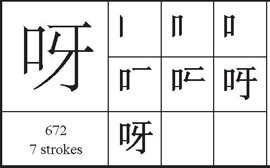
YĀ, an exclamation of surprise; an onomato-poetic sound, e.g., for the creaking of a door; YA, used for euphonic reasons in place of 啊 (108, p. 22) when the word before the particle ends with an open vowel [A] L4
牙 yá (671, above) gives the sound.

YÀ, (bookish) be surprised; amazement, wonder [C]
This is another character in which 牙 yá (671, above) gives the sound.
惊讶 jīngyà surprise L6
訝

YÁ, bud, sprout, shoot [C]
The “grass” radical gives the meaning; 牙 yá (671, above) gives the sound. Karlgren sees 671 and 674 as standing for the same word, etymologically (AD 208).
发芽 fāyá germinate
芽茶 yáchá bud-tea

MIÀN, face; flour; noodles [A]
The character is a picture of a mask covering the face. Now it stands, by sound-loan, for a homonymous word meaning “flour, noodles” (in the traditional character, 面 is the phonetic, with the meaning element “wheat”).
版面 bǎnmiàn layout; space on a whole page
拉面 lāmiàn noodles, ramen
(“flour; noodles” only) 麵
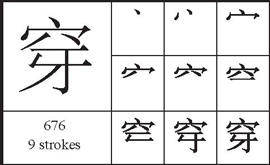
CHUĀN, to pierce; to thread; to don, to wear [A] L2
Pictorially, 穿 is “cave” (454, p. 91) over “tooth,” but logically, perhaps “tooth” → “make a hole in” → “pierce.”
看穿 kànchuān to see right through
穿戴 chuāndài clothing, apparel
穿着 chuānzhuó clothing, apparel

JÌN, be near [A] L2
斤 (342, p. 69) gives the sound, “halt” (90, p. 19) the meaning.
近来 jìnlái recently [B] L6
远近 yuǎnjìn distance (compare 长短 in 659, p. 132); far and near
远近闻名 yuǎnjìn wénmíng have your name heard far and near: be famous
邻近 línjìn be near; be close to

XIŌNG, be cruel; be unlucky (bring bad luck); be calamitous [C]
The “bowl” radical in this character used to be a pit, and the X shape was a person falling, legs up, into the pit: “calamity.”
凶手 xiōngshǒu murderer, (figurative) butcher L6
行凶 xíngxiōng to commit physical assault or murder

LÍ, to part from; from [A] L2
Of disputed etymology. Now a sound-loan for “to part from; from.”
离开 líkāi to leave [A] L3
离别 líbié to part from (for a long time) [D]
离间 líjiān to cause a rift between
離

LIǍN, face [A] L3
The “moon/meat” radical here (as “meat”) helped with the meaning; the right-hand part once helped with the sound.
门脸 ménliǎn facade
笑脸 xiào liǎn a smiling face
不要脸 búyào liǎn be shameless, have no conscience
脸盆 liǎnpén washbasin
臉

SHÙ, number; SHǓ, to enumerate [A] L6
数学 shùxué mathematics [A] L3
数字 shùzì numeral, digit; quantity [B] L4
数目 shùmu number, amount [C] L6
岁数 suìshù (person’s) age [C]
数数儿 shǔshùr to count (“to enumerate the numbers”)
數

XǏ, to wash [A] L2
A sound-meaning compound, the “three-dots-water” helps with the meaning while “先” suggests the sound (now imperfectly).
洗脸 xǐliǎn to wash your face
洗手 xǐshǒu to wash your hands (figuratively, as in English) to wash your hands of something; (of a criminal) to go straight
洗礼 xǐlǐ baptism (literally,“the washing ritual”); (figuratively) a severe test
洗衣机 xǐyījī washing machine [B] L4

WǍNG, to go; bygone; toward [A] L4
往往 wǎngwǎng often, frequently [B] L4
往常 wǎngcháng as was habitual [C] L6
往来 wǎnglái (or
来往 láiwǎng) deal, to deal, do business with; come and go [C]
往事 wǎngshì past events; the past [D] L6
往日 wǎngrì (in) bygone days [D]
往东 wǎngdōng eastward

MĚI, each [A] L2
每天 měítiān every day
每次 měicì each time
每一个 měi yíge each, each one
(MN) Each mom wears a cap

GUÀI, to blame; to consider weird; to be weird [B]
奇怪 qíguài be peculiar, be weird [B] L3
怪话 guàihuà cynical remark; complaint
怪物 guàiwù monster
别怪她 bié guài tā Don’t blame her.
怪不得 guàibude no wonder; so that’s the reason; don’t blame ... L6
(MN) The heart of a saint 圣 is weird

RÁN, be right; so, like this [A]
然 once meant “to roast”; it combined meanings: “meat” (deformed) + “dog” + “fire.” This meaning is now conveyed by “燃” which adds another “fire.” Other meanings by sound-loan.
然后 ránhòu afterward [A] L3
当然 dāngrán certainly; naturally [A] L3
自然 zìrán be natural (大自然: Nature) [B] L4
必然 bìrán certainly [B] L5

WǓ, noon; the 7th “earthly branch” [A]
午 once meant “to knock against” and was a picture of a pestle. Distinguish from 干 (223, p. 45). “Noon” by sound-loan. On the “branches,” see 44, p. 9.
下午 xiàwǔ afternoon [A] L1
午饭 wǔfàn noon meal, lunch [A]
正午 zhèngwǔ high noon

XǓ, to permit; to promise; perhaps; family name [A]
许多 xǔduō a lot; many things [A] L4
许可 xǔkě to permit; permission [D] L6
许愿 xǔyuàn to make a vow (to a god); to promise a reward
許
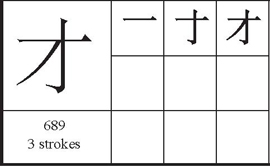
CÁI, substance; natural capacity; talent, genius; then (not till then); only [A] L3
Distinguish from 寸 “thumb” (237, p. 48) and from 扌 (“side-hand”) (28, p. 6).
人才 réncái talented person [B] L5
天才 tiāncái genius, talent [C] L6
才能 cáinéng talent, ability [C]
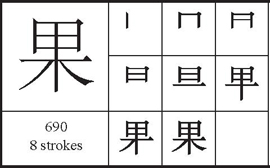
GUǑ, fruit; result; really [A]
Guǒ is a picture of fruit on a tree.
水果 shuǐguǒ fruit [A] L1
干果 gānguǒ dried fruit
结果 jiéguǒ result [A] L4
果然 guǒrán indeed, certainly [B] L4
果仁 guǒrén nut

KÈ, lesson, course; class section [A] L2
下课 xiàkè class dismissed [A]
课本 kèběn textbook [A]
课文 kèwén text [A]
课时 kèshí class hour [D]
第一课 dìyīkè lesson one
課

KĒ, a measure for trees and heads of cabbage [A] L4
三棵大白菜 sānkē dàbáicài three heads of Chinese cabbage (“bok choy” in most American Chinatowns)

SHÌ, world, generation; family name [A]
世 is three “ten” 十 radicals (the vertical stroke on the left is bent for the sake of design) written together to suggest “thirty years: a generation.”
世纪 shìjì century [B] L4
今世 jīnshì this age; be contemporary
世上 shìshang in this world, on earth
世界 shìjiè the world L3

JIÈ, between; to regard as important [A]
介入 jièrù to intervene, get involved
介子 jièzi meson (term from physics: particle of intermediate mass, between baryons 重子 [ zhòngzi “heavy ones”] and lep-tons 轻子 [ qīngzi “light ones”—see Pt. 2, p. 218a for 轻 “be light”].)
中介 zhōngjiè intermediary, agency L5

JIÈ, boundary; world; scope [A]
“田” helps with the meaning, “介” suggests the sound.
世界 shìjiè world [A] L3
边界 biānjiè border [C] L6
国界 guójiè national boundaries, borders
新闻界 xīnwénjiè journalistic circles
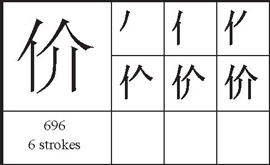
JIÀ, price, value [B]
“介” suggests the sound.
价钱 jiàqián price [C]
原价 yuánjià original price
讲价 jiǎngjià to haggle, discuss price
租价 zūjià rental
價

HǍI, sea; a family name [A]
海关 hǎiguān customs house; Customs [B] L5
海外 hǎiwài overseas, abroad [D]
上海 Shànghǎi Shanghai
海选 hǎixuǎn tryout
地中海 Dìzhōnghǎi Mediterranean Sea
(MN) Every drop of water = sea

BÙ, set, portion, part; department; a measure for vehicles; family name (rare) [A]
部分 bùfen portion, part [A] L4
部门 bùmén department [B] L5
部长 bùzhǎng department head [B]
部首 bùshǒu a “radical”—an element of the Chinese writing system

HUÁNG, yellow; family name [A] L3
黄金 huángjīn “the yellow metal,” i.e. gold [D] L5
黄豆 huángdòu soybean
黄河 Huáng hé the Yellow River
黄了 huángle (collquial) to have fallen through, have come to nothing (literally, “to have turned yellow”)
(田 10)

ZǑNG, to add together; always; probably; surely [A]
总是 zǒngshì always [A] L3
总共 zǒnggòng altogether [C] L5
总得 zǒngděi must, have to [C]
总算 zǒngsuàn at last; on the whole [C] L5
总数 zǒngshù total, total amount [D]
連

LIÁN, to connect; continuously; including; company (military); even; family name [A] L4
连忙 liánmáng at once, promptly [B] L5
连连 liánlián (colloquial) repeatedly
连年 liánnián in consecutive years; year after year L6
连... 都(也) lián ... dou (yě) even (see Chao’s Grammar, p. 766) [B]
總

ZHǏ, just, only; ZHĪ, a measure for animals, birds, boats; single [A] L3
Simplified form can be remembered as “mouth” + “eight.”
只好 zhǐhǎo can do nothing but... [A]
只有 zhǐyǒu can do nothing but... [B] L4
只是 zhǐshì but; only [B]
只要 zhǐyào so long as [B] L4
只得 zhǐdé can do nothing but... [C]
(zhī only) 隻
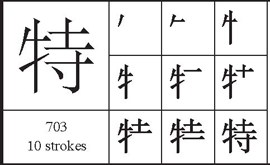
TÈ, be special [A]
特别 tèbié special, especially [A] L3
特点 tèdiǎn special feature [D] L4
特定 tèdìng be specifically designated [D] L6
特地 tèdì for a specific purpose [D]
特意 tèyì same as 特地 [D]
(MN) A cow 牛 in the temple 寺 is special
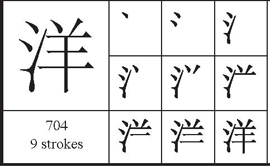
YÁNG, ocean; be foreign [B]
The “water” radical gives the meaning, and “sheep” (yáng) gives the sound.
洋鬼子 yángguǐzi “foreign devil,” foreigner (derogatory)
大西洋 Dàxīyáng the Atlantic
太平洋 Tàipíngyáng the Pacific
东洋 Dōngyáng Japanese, Japan

YÚ, surplus; remainder [B]; (bookish) I, me; family name
其余 qíyú the rest of it [B] L5
余数 yúshù balance, remainder; complement of a number
余闲 yúxián spare time, leisure
(“surplus; remainder” only) 餘

CHÚ, except; to divide (arithmetic); to remove [A] L5
除了... 以外 chúle…yǐwài other than… [A]
除外 chúwài except, excluding [D]
除夕 chúxī (on) New Year’s Eve [D] L5
除去 chúqù in addition to; to remove

n to; to removeAJIĀNG, river; family name [A]
A sound-meaning compound, the “three-dots-water” radical helps with the meaning, but “工” no longer represents the sound in a good way.
长江 Chángjiāng the “long river,” i.e., the Yangtse L4
江西 Jiāngxī Jiangxi (province)
江山 jiāngshān rivers and mountains; landscape; (by metonymy) nation

QUÁN, complete, completely; all, the whole; family name [A]
Distinguish from 金 “gold” (218, p. 44).
完全 wánquán complete(ly); perfectly [A] L4
全部 quánbù the whole thing; completely L4
全面 quánmiàn overall; be comprehensive [B] L5
全力 quánlì with all your strength [D]
全心全意 quánxīnquányì wholeheartedly [D]
(MN) All men are kings
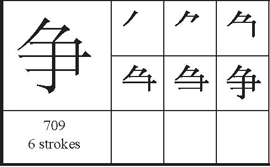
ZHĒNG, to argue, to fight [B]
The character shows two hands struggling over an object (the hand on top is abbreviated).
争取 zhēngqǔ to work hard for [B] L5
争气 zhēngqì be determined; do your best to make a good showing [D] L6
爭
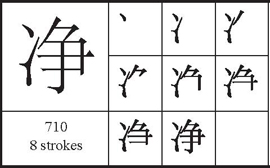
JÌNG, to clean, be clean; net (as opposed to gross); only, all [A]
干净 gānjìng be clean [A] L3
净得 jìngdé net profit
净重 jìngzhòng net weight
(MN) Ice being fought (争) for is clean
淨
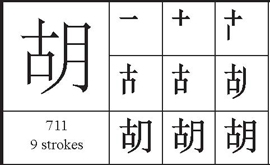
HÚ, barbarians; be foolish; beard, mustache; family name [B]
胡子 húzi beard, mustache [B]
胡说 húshuō to talk nonsense, to blather; Nonsense! Bunkum! [C] L5
胡来 húlái not know what you’re doing; to act like a fool, make trouble; to blunder [D]
(beard) 鬍

HÚ, lake [A]
湖北 Húběi Hubei (province)
湖南 Húnán Hunan (province)
江湖 jiānghú rivers and lakes; all over the country
江湖 jiānghu traveling con artists (entertainers, fake doctors, and the like) or itinerant performers and the like

SHĀNG, quotient; commerce; merchant; family name [A]
商人 shāngrén businessman [A]
商船 shāngchuán merchant ship
商会 shānghuì chamber of commerce
进口商 jìnkǒushāng importer
商量 shāngliàng to negotiate L4
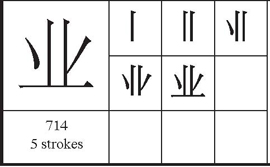
YÈ, business, profession, course of study; property; family name. BUSINESS radical (140) [A]
业 is thick foliage at the top of a tree, to suggest productive activity and prosperity.
商业 shāngyè business, commerce [B] L5
业余 yèyú spare time; amateur [B] L5
重工业 zhònggōngyè heavy industry [D]
業
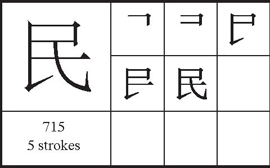
MÍN, folk, people [A]*
人民 rénmín the common people [A]
民主 mínzhǔ democracy, be democratic [B] L5
民间 mínjiān among the people; folk (adjective); non-governmental [C] L6
民用 mínyòng for civil use, civil [C] L6
民事 mínshì relating to civil law [D]
民意 mínyì the will of the people [D]

DǍNG, association; political party; family name [B] L6
国民党 Guómíndǎng Kuomingtang, Nationalist Party
民主党 Mínzhǔdǎng Democratic Party
入党 rùdǎng to join or be admitted to a political party (or to the Party)
党报 dǎngbào party newspaper
(MN) Brother wears a “fancy hat” joining the party
黨

CHǍN, to produce, product; property [A]
Distinguish from 厂 (229, 46), 广 (363, p. 73), and 严 (Pt. 2, p. 236b).
出产 chūchǎn to produce; production output [D]
产业 chǎnyè property (real estate) [D] L6
特产 tèchǎn special local product [D]
共产党 Gōngchǎndǎng Communist Party [B]
產

ZHǍN, to behead; to cut to pieces ; (dialect) to cheat somebody; to blackmail [D]
The character may be remembered as “a chariot with axes in it.”
斩除 zhǎnchū to eradicate, extirpate
斩首 zhǎnshǒu to behead
斬
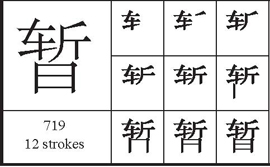
ZÀN, temporarily [B]
暂时 zànshí temporarily [B] L4
暂且 zànqiě for a short time [D] L6
短暂 duǎnzàn be brief, transient [D]
暂定 zàndìng be provisional, temporary
(MN) Cut the sun temporarily
暫

ZHǓN, water-level; standard; to deem to meet a standard, to permit, allow; to cause to meet a standard, to regulate; to be up to a standard, be accurate; quasi-, (sports) semi-
准时 zhǔnshí to be on time [B] L4
准许 zhǔnxǔ to permit [D]
水准 shuǐzhǔn standard, level
准保 zhǔnbǎo for sure
准决赛 zhǔnjuésài semi-final
準
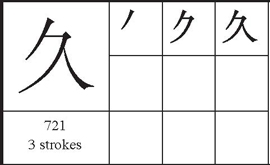
JIǓ, to last for a long time [A] L3
长久 chángjiǔ be long (in time), long-lasting [C]
永久 yǒngjiǔ eternally, permanently [D]
很久没见 hěnjiǔ méijiàn “Long time no see,” (as in the English borrowing) “It’s been quite a while since I last saw you.”

FĀ, to send out, to bring out, to shoot; a measure for rounds (ammunition); FÀ, hair [A] L4
The traditional form: the bow 弓 may help with the meaning “to shoot.” 殳 “club” was once an arrow 失. The meaning “hair” of the simplified character is by sound-loan.
发生 fāshēng to happen [A] L4
发现 fāxiàn to discover [A] L3
头发 tóufa hair L3
(“hair” only) 髮 (other meanings) 發
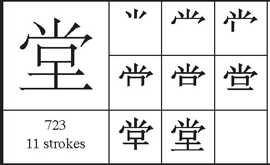
TÁNG, hall; a measure for classes and sets of furniture [A]
堂堂 táng táng be impressive; have high aspirations and bold vision
教堂 jiàotáng church

JIǍNG, to speak; to be conscientious about [A] L3
讲话 jiǎnghuà to talk, make a speech [B]
听讲 tīng jiǎng to attend a lecture [B]
讲课 jiǎngkè to teach, to lecture [C]
讲明 jiǎngmíng to clarify, to explain
演讲 yǎnjiǎng speech, public speaking L6
(MN) Words spoken beside a well
講
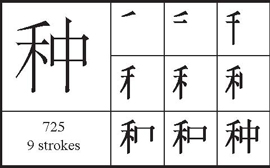
ZHǑNG, kind, sort, species [A]; ZHÒNG, to plant, to sow, to grow [B]; CHÓNG, family name (rare) L3
种子 zhǒngzi seed [B] L6
种地 zhòngdì to farm, till the soil [D]
种种 zhǒngzhǒng all kinds of [D]
种马 zhǒngmǎ stud (horse)
種
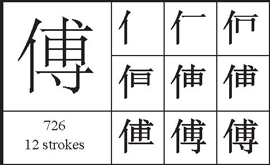
FÙ, to teach; a teacher; to put on, to apply; family name [A]
傅粉 fùfěn to make up, put on face powder
师傅 shīfù master, teacher, mister L4

ZHUĀN, be sole, be unique; solely; family name (rare) [B]
专 gives the sound in a number of characters (see the next few items).
专门 zhuānmén be special, specialized [B] L4
专家 zhuānjiā an expert, specialist [B] L5
专心 zhuānxīn concentrate on [B] L5
专业 zhuānyè specialty (profession or field of study) [B] L4
專
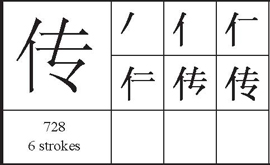
CHUÁN, to transmit; ZHUÀN, record, biography [B]
(MN) To transmit through “the sole man”
传说 chuánshuō to spread a rumor; rumor, legend [C] L5
传真 chuánzhēn facsimile [D] L4
传教 chuánjiào to proselytize
自传 zìzhuàn autobiography
傳

ZHUǍN, to turn [B]
(MN) To turn “the sole car”
转变 zhuǎnbiàn to transform [B] L5
转告 zhuǎngào to pass the word [B] L5
转入 zhuǎnrù to shift to, move over to [C]
转交 zhuǎnjiāo to transmit [D]
轉

ZHUĀN, brick [C]
(MN) The brick is made of “the sole stone”
砖厂 zhuānchǎng brickyard
磚
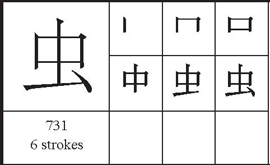
CHÓNG, bug. BUG radical (174) [B]
虫 is said to be a picture of a bug. The traditional form, presumably twice reclarified, has two more bugs (see below).
虫子 chóngzi bug; worm [B]
昆虫 kūnchóng insect L6
蟲
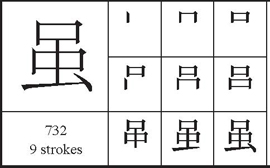
SUĪ, although [A]
虽然 suīrán although [A] L3
虽说 suīshuō (colloquial) although
(MN) Although the insect has a mouth …
雖
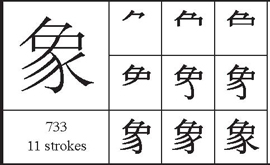
XIÀNG, 1) elephant; image [B]; 2) to present an image of, to look like; picture, portrait, statue; such as… [A]
象 gets meanings marked “2” by being the short form of 像 (see next item). Originally a picture of an elephant. Other meanings by sound-loan.*
现象 xiànxiàng phenomenon (B) L5
(meanings marked “2” only) 像

XIÀNG, to present an image of, to look like; picture, portrait, statue; such as… [A] L3
Karlgren (AD 797) says 像 stands for the same word as 象 (733, above)—reclarified, then, with the “person” radical.
像样 xiàngyàng be up to standard, acceptable, appropriate, decorous, decent [D]

LIÀNG, be bright; to show L4
明亮 míngliàng be well-lit; be bright and clear; to become clear [B]
亮相 liàngxiàng (Beijing opera) to strike a pose; to state your views
天亮了 tiān liàng le It’s already daylight.
(MN) A tall “高” table “几” that lacks a mouth “口” is bright
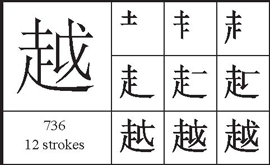
YUÈ, to pass over, to exceed; (if repeated) the more… the more…; family name [B] L3
越... 越... yuè... yuè... the more…, the more... [B]
越来越... yuè lái yuè... more and more… [B]
越过 yuèguò to get across; to negotiate [D]
越界 yuèjiè overstep a boundary; cross a border
越南 Yuènán Vietnam
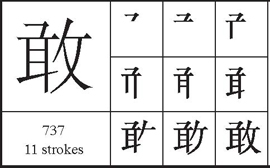
GǍN, to dare, to be so bold as to ... [A] L3
敢情 gǎnqing (dialect) Oh, so…; really (intensifier)
勇敢 yǒnggǎn brave L4
不敢当 bùgǎndāng I don’t deserve such a compliment. L6

BÌNG, be side by side; and; actually; moreover [B]
并且 bìngqiě furthermore [B] L3
合并 hébìng to merge [D] L6
并不 bìngbù certainly not (intensifies the negation)
并行 bìngxíng to implement (two things) at the same time
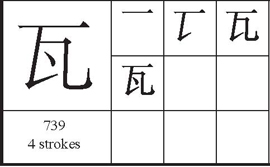
WǍ, tile; unglazed pottery, watt (electrical term). WÀ, to cover with tile, to tile over (a roof). TILE radical (98)
瓦工 wǎgōng bricklaying, tiling, plastering; bricklayer, tiler, plasterer
瓦时 wǎshí watt-hour (electrical term)
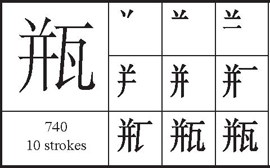
PÍNG, bottle, vase [A]
A sound-meaning compound. “并” (738, p. 48) suggests the sound, “瓦” indicates that originally vases were made of clay.
瓶子 píngzi vase, bottle [B] L4

PĪN, to put together; to fight or work furiously [B]
Use “hand” to put together, “并 738” suggests the sound.
拼音 pīnyīn to spell; pinyin
拼命 pīnmìng to do something desperately; to risk one’s life L6
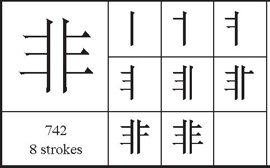
FĒI, be wrong; be false; not. WRONG radical (205) [A] L5
非常 fēicháng exceptionally [A] L2
是非 shìfēi right and wrong [C] L6
并非 bìngfēi It’s not that... [D] L6
胡作非为 hú zuò fēi wéi to act barbarously and behave wrongly; to commit many outrages
非...不可 fēi...bù kě must… [B]

ZÀO, to manufacture, to build; to fake; to go, to visit [B]
造句 zàojù sentence-making [B]
造反 zàofǎn to rebel [D] L6
造爱 zào’ài to make love
捏造 niēzào to fake, to forge
造访 zàofǎng to pay a visit
造汽车 zào qìchē to manufacture cars

YÚ, on, to, at, than; family name [B]
于是 yúshì hence, as a result [B] L4
等于 děngyú be equal to, be equivalent to [B] L5
敢于 gǎnyú to dare to [C]
多于 duōyú be more than L5
于今 yújīn up till now, up till the present
于我 yúwǒ the way I see it,...; with reference to me
於

SHÙ, bundle; to bind; family name [A]. BUNDLE radical (192) L6
Distinguish from  the “thorn” radical (Pt. 2, 229b)
the “thorn” radical (Pt. 2, 229b)
束手 shùshǒu be helpless, be powerless to act; “my hands are tied...”
一束花 yíshù huā a bundle of flowers

SHÙ, a tree; to plant, cultivate; to set up [A] L3
树林 shùlín a grove, woods [B]
树木 shùmù trees [C]
果树 guǒshù fruit tree [C]
树干 shùgàn tree trunk, trunk [D]
树枝 shùzhī branch, twig
树立 shùlì to set up, establish L6
爬树 páshù to climb trees
樹

PÍ, bark, leather, skin, fur; a family name. SKIN radical (153) [B]
皮带 pídaì leather belt [D]
皮革 pígé leather; hide [D] L6
皮包 píbāo briefcase, leather handbag
皮鞋 píxié leather shoes L5
皮蛋 pídàn thousand-year egg
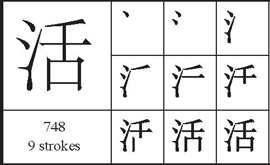
HUÓ, to live, be alive [A]; be lively; be movable [C]; work; product
生活 shēnghuó life; to live [A] L4
活儿 huór work; product [A]
活力 huólì vitality [D] L6
活字 huózì (printing) type, movable type
(MN) To live, there has to be water on the tongue
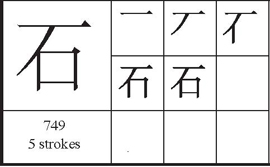
SHÍ, rock; a family name [B]; DÀN, a picul (133⅓ pounds). ROCK radical (136)
The “mouth” is supposed to be a rock that has rolled to the foot of a cliff.
石头 shítou stone, rock [B] L5
石像 shíxiàng stone statue
石英 shíyīng quartz
石子儿 shízír (colloquial) pebble

SĪ, silk; trace, a bit; a unit of weight (0.0005 gram) [B]
真丝 zhēnsī real silk
粉丝 fěnsī vermicelli
一丝不差 yìsī búchà there’s no difference at all
絲
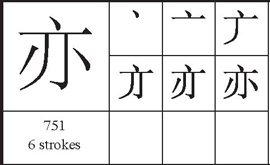
YÌ, also. ALSO radical (162) L6
This was originally a drawing of a man with a stroke on either side to indicate the armpits; it meant “armpit.” This meaning is now conveyed by the character “腋.” “亦” came to mean “also” by sound-loan.
亦步亦趋 yìbùyìqū imitate sb.’s every move

BIÀN, change [A]
Suggest remembering as 亦 + 又. (MN) Also, the right hand changes
变成 biànchéng to change into, become [A]
变革 biàngé to transform [C]
事变 shìbiàn incident; emergency [D]
变更 biàngēng to change, alter, modify [D]
变脸 biànliǎn change emotion instantly, e.g. suddenly become hostile
转变 zhuǎnbiàn to change L5
變

BÙ, step, pace; on foot; a family name [A]
Originally a picture of two feet and meant “walk.”
步行 bùxíng to walk, go on foot [D]
步子 bùzi step; pace [D]

JŪ, to reside; residence, family name [B]
尸 here is a person lying down or sleeping (rather than a corpse) and helps with the meaning: where you sleep is where you reside. 古 in former times helped with the sound.
邻居 línjū neighbor [B] L3
居民 jūmín resident [C]
居然 jūrán unexpectedly [C] L5
居住 jūzhù to reside [C] L6
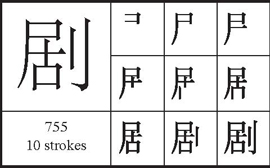
JÙ, stage play; be severe; be intense [B]
京剧 jīngjù Beijing opera L4
歌剧 géjù opera
(MN) In the residence, get cut by knife, severe indeed
劇

JÙ, according to; to take in your hand; evidence, proof [B]
据说 jùshuō it is said… [B] L5
占据 zhànjù to occupy (by force) L6
据点 jùdiǎn stronghold, strong point
據

YÁN, to blaze; to be very hot; inflammation [D]
“Fire” over “fire” = “to blaze, to be very hot.”
发炎 fāyán to become inflamed; inflammation [D] L6
消炎 xiāoyán anti-inflammatory, to reduce inflammation

TÁN, to chat, to talk about, a talk, a speech; a family name [A] L4
The “word” radical gives the meaning; yán (757, above) here has the sound value tán. See also 759, below.
谈话 tánhuà to talk [B]; statement [C]
谈天 tántiān chit-chat [D]
谈心 tánxīn have a heart-to-heart talk; heart-to-heart talk
談

DÀN, to be weak, thin, insipid, pale [B] L5
淡水 dànshuǐ fresh water L6
看得很淡 kànde hěn dàn be indifferent to
生意很淡 shēngyì hěn dàn business is bad

JĪ , to beat, to hit; bump into; an assault [D]
Simplified form looks like “二” bumped into “山.”
击鼓 jīgǔ to beat a drum
击毙 jībì to shoot down, shot dead
擊
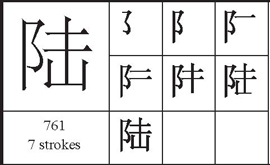
LÙ, land; family name [B] L2
大陆 dàlù continent, mainland; mainland China [B]
陆地 lùdì land, dry land [C] L5
陸
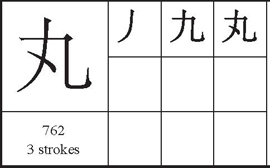
WÁN, bullet, BB, pill, ball. BULLET radical (66) [C] L6
The student should distinguish wán from 凡 (768, p. 154) and from 刃 (Pt. 2, p. 227b).
鱼丸 yúwán fishball (food)
药丸 yàowán medicine pills

ZHÍ, to take hold of, to manage, to direct [B]
执行 zhíxíng to carry out, put into effect [B] L5
执法 zhífǎ to enforce the law [D]
固执 gùzhi be stubborn, obstinate [D] L6
(MN) A hand takes hold of a pill
執

RÈ, to be hot; to make hot, to heat [A] L1
热情 rèqíng enthusiasm, zeal; be enthusiastic, zealous [A] L3
热爱 rè’ài to love ardently [B] L5
热心 rèxīn be enthusiastic; be warm-hearted [B] L5
热带 rèdài the tropics [C]
炎热 yánrè be blazing hot [D] L6
热力学 rèlìxué thermodynamics
熱

DÒU, to fight [B]; DǑU, unit of volume equal to 316 cubic inches, usually translated as “peck.” PECK radical (82)
A picture: an old scoop used to measure out pecks. Now mainly used, by sound-loan, for dòu “to fight.” Traditionally, “to fight” (see below) looks like two kings in a confined space (not its etymology).
斗篷 dǒupéng cape, cloak
斗牛 dòuniú bull-fight
(DÒU only) 鬥

SHÌ, market, marketplace; municipality; standard system of weights and measures [A]
市长 shìzhǎng mayor [C]
市民 shìmín townsfolk, residents of a city
黑市 hēishì black market
市容 shìróng the appearance of a city
市寸 shìcùn Chinese standard inch (≈ 3.333 cm/1.312 inch)
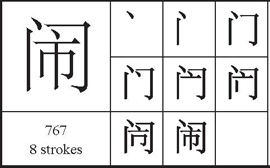
NÀO, to make a disturbance; be disturbed by; to get (perhaps with difficulty) [B]
The traditional form combined meanings: “to fight in the marketplace” (see 765, 766). The modern form can also be understood as the combined meaning of “a market at the city gate.”
热闹 rènào be lively; have a hot time [B] L4
闹笑话 nào xiàohuà make a fool of yourself [C]
鬧
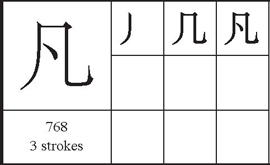
FÁN, be common, be ordinary; all [B]
It is easier to remember this character as an object (the dot) thrown under a table, maybe any old thing you would leave under the table (not its etymology).
凡是 fánshì all those who are [C] L5
平凡 píngfán be ordinary [C] L6
凡人 fánrén an ordinary fellow, a bloke

KǑNG, to fear [B]; perhaps, maybe
A sound-meaning compound, the upper part “巩” gǒng helps with the sound, while the significance of the “heart” is obvious.
恐怕 kǒngpà be afraid that; “probably” [B] L4
恐水病 kǒng shuǐbìng hydrophobia (literally, “fear water sickness”)

YĪN, be dark, be shaded; “yin” in “yin and yang”; be cloudy; be crafty; secret; lunar; negative; incised; to deceive; family name [A] L2
阴天 yīntiān be overcast
阴部 yīnbù private parts
阴茎 yīnjīng penis
阴户 yīnhú vaginal opening
陰

YÁNG, sun, solar; “yang” in “yin and yang”; be open; positive; male organ; to cut in relief; family name [A]
太阳 tàiyáng sun [A] L3
太阳能 tàiyángnéng solar energy [D]
阳极 yángjí (term from electricity) positive pole, anode
阳具 yángjù penis
阴阳 yīnyáng yin and yang
陽
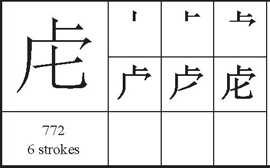
HǓ, tiger. TIGER radical (173)
This is a picture of a tiger. The independent character for tiger is 虎 hǔ, which looks like the radical reclarified with “legs” (see Pt. 2, p. 216b).
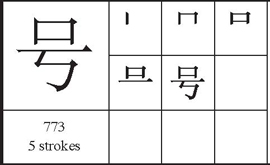
HÀO, appellations, means of identification; name, size, number, sign, mark; command; bugle; HÁO to cry out, to call out [A] L2
问号 wènhào question mark
记号 jìhào mark, sign [D]
十一号(楼) shíyíhào (loú) number 11 (building)
今天几号 jīntiānjǐhào What’s today’s date? 十号 shíhào The tenth.
號

No pronunciation. Radical (31), “top of 予” (see next item)

YǓ , to give, grant; YÚ, I [C]
The student should learn to tell 予 from the “child” radical 子 (44, p. 9), from 于 (744, p. 149), and from the “spear” radical 矛 (Pt. 2, p. 226a).
予以 yǔyǐ to grant, to give [D] L6

YÙ, beforehand; to anticipate [A]
预先 yùxiān beforehand [C] L6
预报 yùbào a forecast [C] L5
预告 yùgào (to give) advance notice [C]
预见 yùjiàn to foresee; foresight [D]
预算 yùsuàn to make plans [D] L6
预言 yùyán to prophesy, prophecy [D] L6
预定 yùdìng to schedule [D] L5
預

BÈI, to prepare, to get ready for [A]
准备 zhǔnbèi to get ready, to intend to [A] L2
预备 yùbèi to get ready, to plan; preparation [B]
备用 bèiyòng reserve, extra, spare [D]
备马 bèimǎ to saddle a horse
備

XĪ, be rare; to hope [A]
The four strokes at the top are supposed to show the loose mesh of a cloth; the “cloth” radical is there to help develop this meaning. The meaning “hope” (the most common modern meaning of this character) is by sound-loan.
希有 xīyǒu rare
希腊 xīlà Greece

WÀNG, to look for; to expect; toward; family name [A]
希望 xīwàng hope, to hope for [A] L2
看望 kànwàng to pay a visit to, to call on [D] L6
名望 míngwàng prestige

HÓNG, be red; red [A]; popular; dividend, bonus L2
Originally referred to a type of pinkish-red thread, thus with the “silk” radical; “工” for sound.
红茶 hóngchá black tea [B]
脸红 liǎnhóng to blush; to get red-faced with anger or excitement
红十字会 Hóng Shízì Huì Red Cross
紅

QIĒ, to slice, to carve; tangent in geometry; QIÈ, sure to; be close to [A]
A “knife” in the character for “to slice, carve” obviously helps with the meaning.
亲切 qīnqiè be closely related to [B] L5
切身 qièshēn be personal; be of importance to a person
切合 qièhé to suit, to go well with

DÀI, to take the place of; an age [A]
代表 dàibiǎo to represent; on behalf of... (representing...); a representative [A] L4
现代 xiàndài be contemporary; modern times [A] L4
古代 gǔdài ancient times [B] L5
代号 dàihào code name [D]
代数 dàishù algebra

DÀI, bag, pocket [B]
The “gown” radical gives the meaning in this character; dài (782) gives the sound.
口袋 kǒudài bag, pocket [B]
睡袋 shuìdài sleeping bag
袋鼠 dàishǔ kangaroo (literally “bag mouse”)

JIĒ, to get; to connect; to meet; to catch; to take over [A] L3
接着 jiēzhe to catch; to follow closely, next [A] L5
接到 jiēdào to receive, answer (telephone) [B]
接近 jiējìn be close to [B] L5
接受 jiēshòu to accept [C] L4

HÉ, and, with; to make peace, harmony; HUÒ, to mix; HUO, a verb-suffix: “comfortably” [A]; HÚ, complete a set in mahjong L1
和平 hépíng peace; be mild (medicine) [B] L5
和气 héqì be gentle, be amiable, be kind [D] L6
和尚 héshang Buddhist monk [D]
(MN) Grain (禾) in the mouth—peace!

HUÀ, to change; to melt; to evaporate; works like English suffixes -ize, -ify [A]
(MN) If “man” + “ladle” suggests “alchemy” to you, you can use that as a mnemonic for
化 “Alchemy” = “to transmute, to change.”
化学 huàxué chemistry [A] L5
化工 huàgōng chemical industry [C]
(工业)化 (gōngyè) huà to (industrial)ize [B]

HUĀ, flower, blossom; be flowery; design; cotton; to spend; fireworks [A] L3
花生 huāshēng peanut [C] L5
花样 huāyàng design, pattern, flower-like [D]
放花 fànghuā to set off fireworks
一束花 yíshù huā a bunch of flowers

HUÁ, flowers; glory; be magnificent; be prosperous; the best part; Chinese; HUÀ, a family name
Distinguish from 毕 (1039, p. 208).
中华民国 Zhōnghuá Mínguó The Republic of China
中华人民共和国 Zhōnghuá Rénmín Gònghéguó The People’s Republic of China
華

HUÁ, noise, clamor; HUĀ, onomatopoetic: Clang! or Gurgle gurgle! [C]
哗众取宠 huázhòngqǔchǒng try to please the public with claptrap
嘩, 譁 (譁 = huá only)
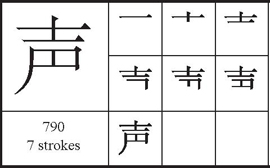
SHĒNG, sound, tone; to declare; reputation [A]
声音 shēngyīn sound [A] L3
声明 shēngmíng to declare; declaration [C] L6
立体声 lìtǐshēng stereo
环绕声 huánràoshēng surround sound
聲

RÀNG, to yield, to allow; to lower (in price); to offer; to step aside; to cause, to make; by [A] L2
让步 ràngbù to concede, to compromise [D] L6
让位 ràngwèi to abdicate; to give way to
讓
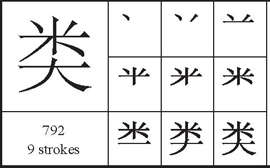
LÈI, kind, type; resemble [B] L2
人类 rénlèi mankind [B] L5
同类 tónglèi be of the same kind [D]
分类 fēnlèi to classify [D]
类别 lèibié class (resulting from a classification); category
(MN) A type of rice, very big
類

XIŪ, to rest; to cease; to divorce [A]
休 combines meanings and is supposed to show a man resting under a tree, whence “to rest.”
休学 xiūxué to drop out (of school)
休业 xiūyè to close a business (for a holiday or vacation); to cease operations

XĪ, to breathe; to rest; to stop; to cease; a family name [A]
息 is supposed to combine “nose” + “heart” to suggest “to breathe.” (The significance of “heart” is, perhaps, that you breathe because your heart still beats.)
休息 xiūxī to rest [A] L2
信息 xìnxī information, news [C] L5
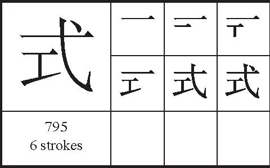
SHÌ, form, fashion, model, style [B]
The modern form may be remembered as 工 + 弋.
新式 xīnshì new style [C]
式样 shìyàng style, type [D]
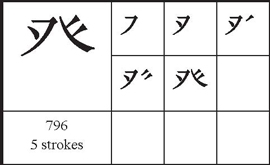
BÒ, back-to-back; be opposed. BACK radical (154)
The character shows two feet—the “toe” radical 止 (246, p. 50)—faced away from each other, that is, back to back. Hence the idea “back.” Not seen as an independent character now.

DÒU, flask; bean, pea. FLASK radical (191) [B]
The character is a picture of a food vessel. The meaning “bean, pea” is by sound-loan.
豆子 dòuzi bean, pea [C]
土豆 tǔdòu potato [B] L5

DĒNG, to go up; to press down on with the foot; to publish [B]
Distinguish from 凳 (Pt. 2, p. 266a).
登报 dēngbào to publish (in a newspaper or magazine)
登山 dēngshān mountain-climbing
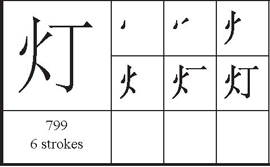
DĒNG, lantern, lamp [A] L3
The “fire” radical here gives the meaning; dīng (624, p. 125) gives the sound.
灯火 dēnghuǒ lights [C]
点灯 diǎndēng to light a lamp
花灯 huādēng colored lantern
燈
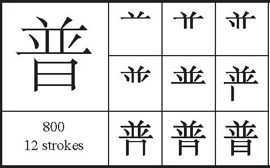
PǓ, be general, be universal; a family name [B]
Suggest remembering 普 as “side by side” (738, p. 148) + “sun” to suggest “all the places the sun shines”: “universal, general.”
普天下 pǔtiānxià all over the world; everywhere
普希金 Pǔxījīn Pushkin (the Russian poet)

YǑNG, bulk measure: ten “pecks”; name of a river in Zhejiang province; short for Ningbo (the city—which is on the Yong River)
Some say 甬 originally meant “a big bell” and was a picture, with the hook at the top by which the bell could be hung. Others say it is a picture of a bucket. “Ten pecks” is by sound-loan.
甬道 yǒngdào covered passage, corridor
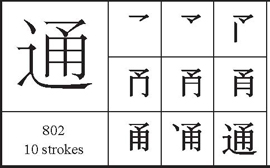
TŌNG, to go through; to be thoroughgoing, to be universal [A]
通过 tōngguò to go through; to pass in a parliamentary meeting [A] L4
通知 tōngzhī to inform; a notice [A] L4
通常 tōngcháng be general, be usual [C] L5
普通 pǔtōng be universal; be widespread or common [B]
普通话 pǔtōnghuà Mandarin Chinese [B] L3
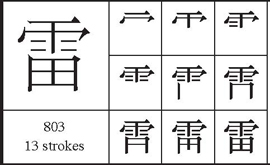
LÉI, thunder; mine (military weapon); family name [B] L5
雷雨 léiyǔ thunderstorm
地雷 dìléi landmine
(MN) Rain + field

SHĒN, to stretch; to state, to inform; Shanghai; the ninth “earthly branch”; family name. STRETCH radical (144).
Originally a picture of “lightning,” current meaning by association.
(MN) Lightning strikes the field
申请 shēnqǐng to apply for L4
申报 shēnbào to report (to a superior); to declare (to Customs) L6

DIÀN, electricity; lightning [A]
The “twist” radical  is a streak of lightning falling (the traditional form—see below, this frame—has rain above). Etymologically related to 804.
is a streak of lightning falling (the traditional form—see below, this frame—has rain above). Etymologically related to 804.
电灯 diàndēng electric light [A]
电话 diànhuà telephone [A]
电气 diànqì electricity [D]
電

SHÉN, spirit; god; family name [A]
A sound-meaning compound.
神经 shénjīng nerve [B] L5
神话 shénhuà mythology, myth [C] L5
神气 shénqì air, manner; be spirited; be cocky, show “attitude” [C] L6
神情 shénqíng expression, look [C] L6
神奇 shénqí be magical, miraculous L6
精神病 jīngshénbìng mental illness; nervous disease

SHĒN, to stretch, to extend [B] L5
申 (804, p. 161) gives the sound; it also appears to help with the meaning.
伸手 shēnshǒu to stretch out your hand; to ask for help [D]
能屈能伸 néngqū néngshēn can take temporary setbacks
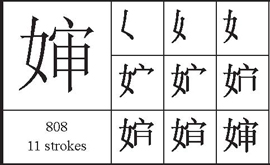
SHĚN, wife of your father’s younger brother; aunt; polite address to a woman about your mother’s age
“Aunt” is not really a good translation, given the precision with which familial relationships are identified in Chinese culture and language.
婶母 shěnmǔ wife of your father’s younger brother; aunt
婶子 shěnzi (colloquial) same as 婶 [C]
嬸

SHĚN, be careful; to examine closely; to interrogate; (bookish) to know; (bookish) indeed, truly [C]
审定 shěndìng to examine and approve [D]
审理 shěnlǐ to try a case [D] L6
审美 shěnměi to appreciate beauty [D] L6
(MN) To state under the roof carefully
審

SHŌU, to put away; to receive; to collect [A] L4
收入 shōurù income; to earn [B] L4
收成 shōuchéng harvest [D]
收回 shōuhuí to recall; to countermand [D]
收买 shōumǎi to buy; to bribe [D]
收支 shōuzhī income and expenditures [D]
收音机 shōuyīnjī a radio [B] L6
收起来 shōuqǐlái to put away

RADICAL (130), “top of 春” (see next)
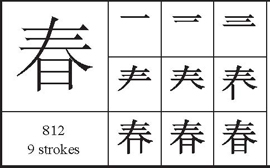
CHŪN, spring (the season); erotic feeling, erotic; a family name [A] L3
春 is supposed to show vegetation burgeoning in the sun.
春天 chūntiān springtime [A]
青春 qīngchūn youth [C] L5
春意 chūnyì the feeling of early spring; thoughts of love
春宫 chūngōng pornography

ZHÀO, omen; a family name [D]
兆 shows the cracks on the heated tortoise shell which were anciently used in China for divination. (Read the note in 159, p. 32.)
兆头 zhàotou omen
预兆 yùzhào signs of the times L6
吉兆 jízhào a good omen

TIÀO, to leap [A]
The “foot” radical gives the meaning; zhào (813, above) is supposed to give the sound.
跳远 tiàoyuǎn broad jump [D]
跳高 tiàogāo high jump [D]
心跳 xīntiào heart palpitations
撑杆跳 chēnggāntiào pole vault, pole jump

TIĀO, carrying pole (with bucket or basket on each end); to carry in such a way; measure for a pair of buckets or baskets so carried (一 挑 = two buckets or baskets) ; to select; TIǍO, to probe [B]
一挑水 yìtiāo shuǐ two buckets of water carried on a pole
挑衅 tiǎoxìn to provoke
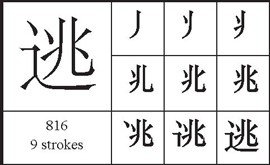
TÁO, to run away [B] L5
The “halt” radical gives the meaning here (suggesting, as it often does, motion rather than stasis). 兆 zhào (813, above) is the phonetic element, giving a rhyme rather than a homonymous sound.
逃跑 táopǎo to run away [D]
逃犯 táofàn a fugitive from justice

SHĀ, to kill; to sting (as antiseptic on a cut); to hurt; to fight to reduce; to brake, to stop [B] L5
In script reform, the meaning part—the “club” radical (see below, this frame) disappeared, leaving only the traditional sound element.
自杀 zìshā to commit suicide [D]
杀人 shārén to commit murder
杀气 shāqì to look or act like you wanted to kill somebody
殺
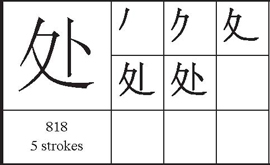
CHÙ, place; CHǓ, to dwell [A]
处 has “follow/slow” + “man,” but “follow/slow” was originally a picture of a stool, suggesting a man sitting on a stool, resting → resting place → place.
处分 chǔfèn to discipline, to punish [B] L6
处于 chǔyú to be (in a certain condition/position)
处处 chùchù everywhere; in every way [C]
处女 chǔnǚ virgin
處

FĒNG, wind; news; custom; rumor; desire. WIND radical (121) [A]
风力 fēnglì wind-power; wind force [B]
风气 fēngqì general mood; common practice [C] L6
风尚 fēngshàng prevailing custom [D] (distinguish from 风向 fēngxiàng 885, p. 178)
风闻 fēngwén get wind of
風
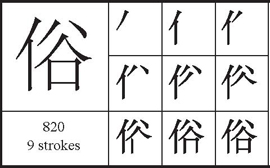
SÚ, be vulgar, be common [B]
The “valley” radical 谷 is supposed to suggest “ravines, mountain country”; with the addition of “man,” we get “hillbilly,” hence “uncultivated, vulgar.” Note that, this is more of a mnemonic than real etymology.
风俗 fēngsú custom [B] L5
俗气 súqì be in poor taste

SǏ, to die; be dead; stubbornly [A] L4
死 combines meanings. The “ladle” radical is corrupted from an earlier “man” radical, and “man” + “bone chips” is supposed to suggest death.
死亡 sǐwáng to die; death [C] L6
死尸 sǐshī corpse
死党 sǐdǎng diehards, sworn followers, best friends forever
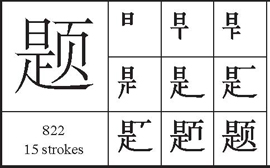
TÍ, theme, subject, to write [A] L2
问题 wèntí question, problem [A] L2
题目 tímù topic, title, heading; problem, exercise [B] L5
出题 chūtí to set questions (for an exam)
题词 tící an inscription; a dedication
題

QIŪ, autumn [A] L3
In China, after the grain is threshed, it is common to stack and burn the unusable stalks. These “grain fires” are a part of the autumn scene; whence, perhaps, this character.
秋天 qiūtiān autumn [A]

LIÁNG, be cool, be cold; LIÀNG, to make or become cool [A]
The “ice” radical appears in this character for the meaning. Traditionally, often written as 涼 (where the meaning element is “water”).
凉快 liángkuài be cool; to cool off [A] L4
着凉 zhāoliáng to catch cold [C] L5
凉水 liángshuǐ cold water, unboiled water [C]

YUÁN, be round (but see 826); person with certain duties, member [A]
“Mouth” + “cowrie” is supposed to suggest roundness. The meaning “member” is by sound-loan.
教员 jiàoyuán teacher [B]
会员 huìyuán member [D]
海员 hǎiyuán sailor
员工 yuángōng staff, personnel
員

YUÁN, be round; to make plausible; make excuses; currency (yuan : the monetary unit of China); a coin [A] L4
This character is now often used rather than 员 (825) to mean “be round.” The character is reclarified with the “surround” radical. See also 元 (89, p. 18).
圆圈 yuánquān a circle, a ring
圆满 yuánmǎn satisfactory, to come to perfection L6
圓
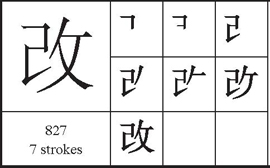
GǍI, to change [A]
改变 gǎibiàn to change, change [A] L4
改革 gǎigé to reform, improve [B] L5
改进 gǎijìn to make better [B] L5
改造 gǎizào to remake, to reform [B]
改正 gǎizhèng to correct (an error) [B] L5
改良 gǎiliáng to improve, improvement [C] L6
(MN) “Knock” “self” to change
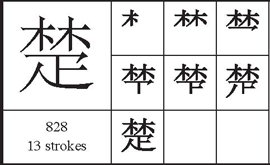
CHǓ, be distinct; a family name [A]
清楚 qīngchǔ be clear; see clearly, understand [A] L3
楚楚 chǔchǔ be clear; be neat; be dainty; delicate
一清二楚 yìqīngèrchǔ be very clear

LIÚ, to keep; to stay; ask someone to stay; leave behind; family name [A] L4
留念 liúniàn to accept or keep (souvenir) [A]
留意 liúyì to be careful, attentive [D]
留心 liúxīn to be careful [D]
留声机 liúshēngjī record player
留学生 liúxuéshēng student studying abroad [A]
































































































































































































 is a streak of lightning falling (the traditional form—see below, this frame—has rain above). Etymologically related to 804.
is a streak of lightning falling (the traditional form—see below, this frame—has rain above). Etymologically related to 804.






















